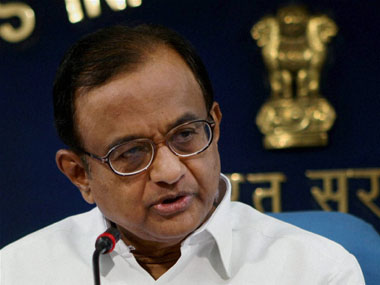Finance Minster P Chidambaram has said he expects the RBI to fall in step with the government by reducing interest rates in response to FDI reforms and the increase in fuel prices undertaken. He has said this in an interview published in The Economic Times today.
The government seeking a cut in interest rates from the RBI is fine, but dictating one would mean a disaster in the making.
The government has vested interest in cheaper rates. It can borrow more at lower cost, it can please capital markets and sell shares of its companies, boosting its finances which will in turn help it dole out more subsidies.
[caption id=“attachment_474836” align=“alignleft” width=“380”]  The government has vested interest in cheaper rates. It can borrow more at lower cost, it can please capital markets and sell shares of its companies, boosting its finances which will in turn help it dole out more subsidies. AFP[/caption]
The government, to a certain extent, does not mind inflation as it reduces the fiscal deficit in nominal terms. It also believes that lower rates coupled with stronger capital markets will help the rupee regain its strength. The local currency has depreciated by more than 20% against the US dollar over the last year and a half.
The government’s argument for lower interest rates is well supported by financial market participants as they thrive on prospects of cheaper liquidity.
Bankers like lower interest rates as it boosts treasury profits and also improve the net interest margins (NIMs) as lower rates first filter into lower deposit rates before filtering into lending rates. Industry has never supported higher interest rates enforced by the RBI as it hurts profits.
The government and industry choose to turn a blind eye to the fact that dictating to the central bank on rates actually hurts them more. A central bank that listens to the government and industry on rate cuts builds up inflation in the economy, creates bubbles which when burst throws the economy down a steep slope, takes down the currency as markets lose faith in the fundamentals and creates problems rather than solving them.
One has just to look back to 2009-10, when inflation was threatening to spiral and everyone in the government and the industry wanted the RBI to not hurriedly raise rates, as they expected it will hurt growth.
The result? The inflation hit double digits and the rupee record lows, bond yields surged and equity markets weakened. In fact, the markets and the economy are just recovering from the behind the curve policies of the RBI in 2009-10 when rate hikes were too slow in reacting to inflationary pressures.
It is good the RBI is left alone to take decisions on monetary policy. The central bank may be perceived as too slow in reacting to falling economic growth. The country’s GDP growth is forecast to fall to about 5.5% in 2012-13 from 6.5% and 8.4% witnessed in 2011-12 and 2010-11, respectively.
One has to realise the RBI has just come out of what many see as the mistake of a century in being behind the curve on inflation in 2010-2012. The RBI is also suffering from a lack of credibility with the rupee falling to all-time lows against the US Dollar in 2012 and from the governor drifting a few notches down the global central bankers’ ranking.
The RBI on its own is likely to cut rates when it reviews its policy on 30 October. Banks’ cash reserve ratio (CRR) cut of 25 bps in its policy review in September 2012 with an accompanying statement on the central bank’s focus on growth going forward is seen as a precursor to repo rate cuts.
However, now with the FM stating that the RBI needs to fall in line with the government’s focus on growth, there will be many eyebrows raised when the RBI actually cuts rates.
Bond markets will turn skeptical on rate cuts as traders perceive the move has been prompted by the government and that it will lead to inflation down the line. The rate cut may result in a rise in bond yields, and not a fall, thus negating everything the government wanted from such a move.
The government should leave the RBI alone if it wants to achieve its objectives of lower interest rates. A government doing its job of managing the economy efficiently is enough for the RBI to act on its own.
Arjun Parthasarathy is the Editor of www.investorsareidiots.com a web site for investors


)
)
)
)
)
)
)
)
)



